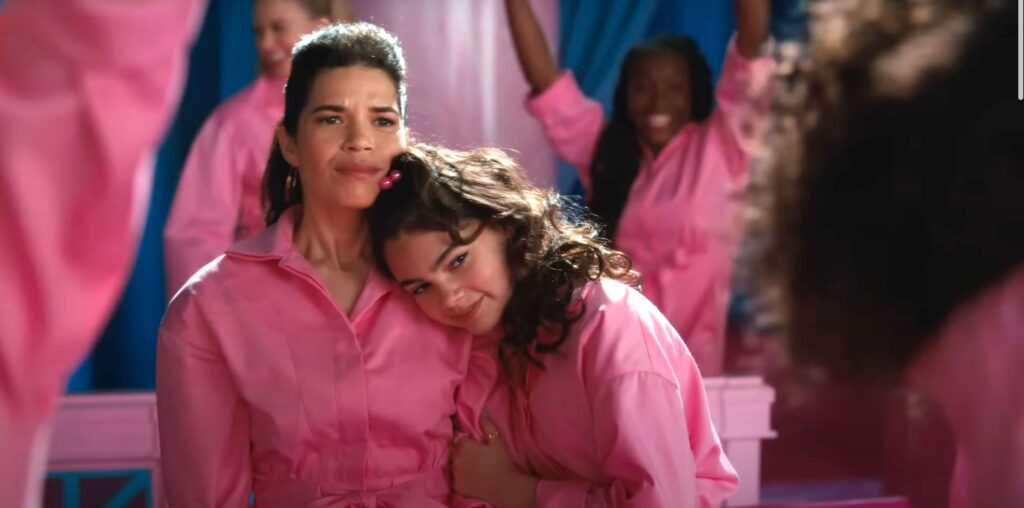Greta Gerwig is a fantastic artist. She has delighted us with her wonderful female gaze in movies like Frances Ha, Ladybird, Little Women, and this time, Barbie.
Even though Barbie’s history seems in pro of women’s rights, for many decades Barbie set unfairly strict standards on what made a woman important, for example, being skinny, beautiful, rich, fashionista, and most specifically, Caucasian. Gerwig’s perspicacious abilities can be appreciated in her movie when she uses irony to judge Mattel’s questionable past. For example, when they discontinued Midge, Barbie’s pregnant best friend. She also judges modern Mattel being run, mostly, by men. She also uses comedy along with ingenious actor and comedian, Will Ferrell, who is only focusing from his male gaze on how perfect and cellulite-free Barbies must be.
Throughout the story, we can learn Barbieland is a matriarchal society, from which Ken and the other Kens want to rebel once Ken visited the real world and experienced the benefits of men in a patriarchy. The plot becomes a power struggle between women and men, while Weird Barbie is the woke teacher who is trying to help Barbies value themselves while they recuperate their throne. Meanwhile, Gloria, a Mattel receptionist, plays with her daughter’s Barbies to feel better about herself. She imagines Barbies that represent real women with real-life challenges, like cellulite, death thoughts, and a distanced relationship with their teenage daughters. Perhaps, modern-day women’s desire to see a representation of real women in dolls is the seek for comfort and relatability to cope with internal conflict. Gloria’s internal discomfort leads Barbie to have troubled days with cold water, rotten milk, burnt toast, and the most shocking, flat feet. The movie spins around two different dimensions, Barbieland, and the real world.
Throughout the characters’ journey to embrace themselves and regain Barbieland, Greta Gerwig delights us with a heart-wrenching monologue that can move almost every woman who has faced contradictory and unfair expectations from society and feelings of disappointment or not being enough.
Such monologue is explained by Gloria to Barbie when Barbie feels like a failure because she is no longer perfect:
“It is literally impossible to be a woman. You are so beautiful and so smart, and it kills me that you don’t think you’re good enough. Like, we have to always be extraordinary, but somehow, we’re always doing it wrong.
You have to be thin, but not too thin. And you can never say you want to be thin. You have to say you want to be healthy, but also you have to be thin. You have to have money, but you can’t ask for money because that’s crass. You have to be a boss, but you can’t be mean. You have to lead, but you can’t squash other people’s ideas. You’re supposed to love being a mother but don’t talk about your kids all the damn time. You have to be a career woman, but also always be looking out for other people. You have to answer for men’s bad behavior, which is insane, but if you point that out, you’re accused of complaining.
You’re supposed to stay pretty for men, but not so pretty that you tempt them too much or that you threaten other women because you’re supposed to be a part of the sisterhood. But always stand out and always be grateful. But never forget that the system is rigged. So, find a way to acknowledge that but also always be grateful. You have to never get old, never be rude, never show off, never be selfish, never fall down, never fail, never show fear, never get out of line. It’s too hard! It’s too contradictory and nobody gives you a medal or says thank you! And it turns out in fact that not only are you doing everything wrong, but also everything is your fault.
I’m just so tired of watching myself and every single other woman tie herself into knots so that people will like us. And if all of that is also true for a doll just representing women, then I don’t even know.” (America Ferrera as Gloria, Barbie, 2023)

In the end, Barbies and Kens realize the importance of an equal world with equal opportunity and resource division between genders. Mattel accepts its previous mistakes and becomes more equal-minded towards women in the workforce and offers a genuine, respectful representation of women in their toys. At last, we can see Ruth Handler telling Barbie she can be anything she wants, even if that means becoming a real-life working woman with pink Birkenstocks and flat feet. Even though Barbie had its internalized misogyny beginnings, it was still a novel, rebellious toy that allowed young girls of dreaming of free adulthood where they can choose to work in any profession other than being a mother. We can observe the slow progress in the history of Feminism and liberated, independent women. But we can also observe how the women’s liberation movement began its direction for Caucasian women and decades later, for Black, Asian, and Latina women. We can remember that feminism worked in favor of white women throughout the XXth century, and natural, curvy, and different-colored bodies started being represented until the decade of 2010.
Although Greta Gerwig’s politics are feminist and supportive of an equal world with matching access to opportunity, Mattel is not. We need to remember that this movie, no matter how fun it was, it is still a gigantic marketing strategy to increase Mattel’s sales and people’s consumption of unnecessary goods. Mattel is NOT Feminist and does not believe in the same access for all. If that is not the case, then why do they keep exploiting poor women of color in sweatshops in Asia?
Unfortunately, a company cannot call itself “feminist” if they exploit its workers, especially women workers. According to the World Development Movement, the Catholic Institute for International Relations, and the Trades Union Congress research in the 90s, Barbie dolls were made by Chinese workers who were paid less than $ 1.29 USD per day. Chinese factories were subcontracted by Mattel and workers did shifts of at least 10 hours, seven days a week. Nowadays, Mattel is the world’s largest toy company, and it spends $2.76 USD on advertising each Barbie, more than its workers make in a day. Mattel sells globally two Barbie dolls every second. 90% percent of Barbie dolls are made in China and each worker would have to work 523 years to pay the same amount Mattel spends on advertising Barbie daily.
Harriet Lamb, 62, former World Development Movement’s Campaign Coordinator conducted research in Bangkok in the early 90s and said, “We would like to see companies bringing the same tight safety controls for workers as they have for the toys themselves” (Lamb in Garner, 1995). How can a company care more for a piece of plastic than humans? According to World Development Movement, 90% of Mattel’s sweatshop workers are women. In the research, one of the workers said “We have to do it, otherwise we would be dismissed… One month, the management gives 60 dolls for one worker to produce, but when we finish the 60 dolls per month, they will increase it another 10 to 70 dolls; if we finish 70 dolls, they will increase it again” (anonymous worker in Garner, 1995).
In 2014, Barbie’s sales were shrinking, so the company decided to appropriate a social movement. Therefore, they tried to make Barbie “inclusive” with Barbies of different skin colors and body types; giving the appearance of a reformed company interested in social well-being. However, according to China Labor Watch’s eight-year investigation, Mattel kept sub-contracting Chinese sweatshop factories. What was Mattel’s response? They threatened to sue China Labor Watch.
In 2021, Mattel made a gross revenue of 1.68 billion US dollars. In 2022, the revenue decreased to 1.49 billion US dollars. Nonetheless, Mattel’s CFO, Anthony DiSilvestro, in a talk with UBS Consumer and Retail Conference said sales were predicted to increase by 47% by the end of 2023. This is clearly due to increased advertising, including the latest Barbie movie. Sales were also expected to decrease by 25-30% due to inventory reductions. Talking about 2023 Barbie’s sales, DiSilvestro said “Inventory reductions are expected to peter out in the second quarter, followed by inventory growth in the third and fourth quarter as retailers prepare once more to stock up” (DiSilvestro in Gaetano, 2023). “As retailers prepare once more to stock up” in other words “as modern-day slaves are exploited enough to make more dolls as sales increase by the fourth quarter of 2023”.
Bibliography
China Labor Watch. (2013). Mattel’s Unceasing Abuse Of Chinese Workers: An Investigation Of Six Mattel Supplier Factories. Available in https://chinalaborwatch.org/mattels-unceasing-abuse-of-chinese-workers-an-investigation-of-six-mattel-supplier-factories/
Gaetano, Chris. (2023). Mattel CFO sees movie tie-in boosting Barbie sales. Retail Dive. Available in https://www.retaildive.com/news/mattel-cfo-sees-movie-tie-in-boosting-barbie-sales/645409/
Garner, Clare. (1995). Poverty Pay Off Barbie Doll Workers. Independent. Available https://www.independent.co.uk/news/poverty-pay-of-barbie-doll-workers-1527023.html#comments-area
Jankowski, Glen. (2016). The new Barbies aren’t so great for the sweatshop workers who make them”. Body image, critical Psychology and other stuff. Available in https://glenjankowski.wordpress.com/2016/01/30/the-new-barbies-arent-so-great-for-the-sweatshop-workers-who-make-them/
Tighe, D. (2023). Revenue of Mattel’s Barbie brand worldwide from 2012 to 2022. Statista. Available in https://www.statista.com/statistics/370361/gross-sales-of-mattel-s-barbie-brand/






Can you be more specific about the content of your article? After reading it, I still have some doubts. Hope you can help me.
Appreciating the commitment you put into your website and detailed information you present. It’s awesome to come across a blog every once in a while that isn’t the same old rehashed material. Excellent read! I’ve saved your site and I’m adding your RSS feeds to my Google account.
I like the valuable info you provide in your articles. I’ll bookmark your blog and check again here frequently. I am quite sure I will learn plenty of new stuff right here! Best of luck for the next!
Thank you for your sharing. I am worried that I lack creative ideas. It is your article that makes me full of hope. Thank you. But, I have a question, can you help me?
Good – I should certainly pronounce, impressed with your website. I had no trouble navigating through all tabs as well as related info ended up being truly easy to do to access. I recently found what I hoped for before you know it in the least. Quite unusual. Is likely to appreciate it for those who add forums or anything, site theme . a tones way for your client to communicate. Nice task..